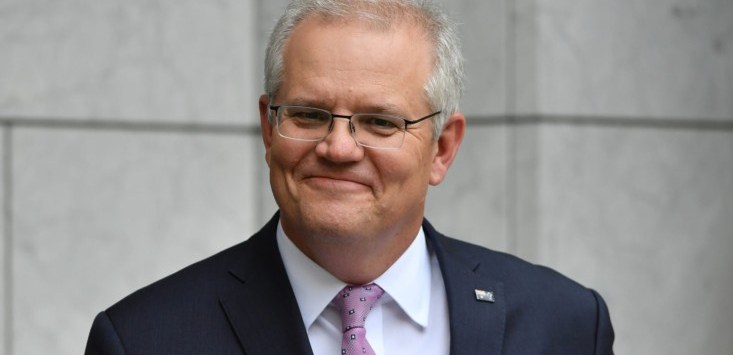
Prime Minister Scott Morrison at a press conference at Parliament House in Canberra, on Friday, October 9, 2020. Source: AAP/Mick Tsikas.
The federal opposition and union leaders have savaged the Coalition’s re-commitment to industrial relations reform, arguing the planned amendments would serve to lower wages and worsen working conditions.
On Saturday, Prime Minister Scott Morrison told the Australian Financial Review his party “absolutely” supports a collection of industrial relations amendments it hoped to pass in last year’s so-called “omnibus” bill.
The bill hit the Senate in early 2021, hosting a number of changes designed to shake up the enterprise bargaining agreement (EBA) system.
In its bill, the Coalition hoped to suspend the Better Off Overall Test (BOOT) for some companies disadvantaged by COVID-19, watering down a measure the Fair Work Commission uses to determine if an EBA provides better conditions for employees than an underlying industry award.
The Morrison government wanted to simplify the award system, condense the EBA approval process into a 21-day timeframe, and institute eight-year “greenfield” provisions for major new projects, effectively barring industrial action taking place halfway through development.
The Coalition also pushed for measures allowing business owners to pay their part-time staff overtime hours at their standard rate of pay, instead of incurring penalty rates. Its proposed bill also aimed to create a new criminal offence for major and systemic wage theft.
But major opposition from Labor, the Greens, and much of the crossbench saw the bill pass in a diluted form: the Coalition’s call for employers to offer casual staff permanent employment after a year of work was one of the only key policies included in the final bill.
Industrial relations reforms return to the fore
The matter proved far from resolved. Over the Easter weekend, Morrison confirmed his government, if re-elected, would again pursue the same policy framework.
On Sunday, Greens leader Adam Bandt, whose Senate colleagues helped to block many facets of the original bill, said on Twitter that the “PM’s IR bill needs to stay in the bin where it belongs”.
After Morrison flagged his party could return to its industrial relations agenda if re-elected, Labor’s industrial relations spokesperson Tony Burke yesterday told the AFR he was not surprised the Coalition would relitigate policies which he claims would “cut to wages and conditions”.
Sally McManus, secretary of the Australian Council of Trade Unions, also suggested those policies would suppress wages if enacted.
“The discredited laws he wants to bring back strip away some of the most basic protections working people have against pay cuts – such as the Better Off Overall Test,” she said on Monday.
While the policies were poorly received by the Opposition and unions, business groups including the Australian Chamber of Commerce and Industry (ACCI) and the Australian Industry Group (Ai Group) said the bill contained “modest, practical and fair amendments” to the Fair Work Act.
The failure of the Parliament to pass the legislation was also labelled “disappointing” by former chair of the Council of Small Business Organisations Australia (COSBOA) Mark McKenzie, who said “there were no winners” from the divisive debate on the reforms.
Writing for SmartCompany in April 2021, McKenzie was critical of the big employer groups, which he said “practised behaviours that have paralysed IR reform in recent years”.
Greenfield pledge welcomed by miners
Tuesday saw Morrison confirm a re-elected Coalition government would again push for six-year greenfield agreements, including annual pay bumps for employees covered by those policies.
Speaking before the WA Chamber of Minerals and Energy, Morrison reportedly described the new greenfield push as a “standalone” reform, unlike 2021’s omnibus package.
The announcement of greenfield agreement reforms for projects worth $500 million and above was warmly welcomed by the ACCI.
“With the continued growth in Australia’s vibrant mineral and energy sectors, and an ambitious pipeline of new infrastructure investment set for the years ahead, this reform will provide businesses with the certainty and confidence that major projects will be completed on time and on budget,” said ACCI chief executive Andrew McKellar.
Steve Knott, CEO of the Australian Resources and Energy Group, AMMA, said it makes “no sense” for greenfield agreements to expire after four years, “when the construction of large-scale resources and energy projects can often exceed that.
“Even a small increase to six years would make a huge difference to the international investment community that determines which nations they will allocate billions of dollars of major project capital.”
Handpicked for you

COVID-19 took the spotlight off wage theft, but Australia still has an underpayment problem



COMMENTS
SmartCompany is committed to hosting lively discussions. Help us keep the conversation useful, interesting and welcoming. We aim to publish comments quickly in the interest of promoting robust conversation, but we’re a small team and we deploy filters to protect against legal risk. Occasionally your comment may be held up while it is being reviewed, but we’re working as fast as we can to keep the conversation rolling.
The SmartCompany comment section is members-only content. Please subscribe to leave a comment.
The SmartCompany comment section is members-only content. Please login to leave a comment.